Abstract
The dilemma of whether and how to disclose a diagnosis of cancer or of any other terminal illness continues to be a subject of worldwide interest. We present the case of a 62-year-old Japanese woman afflicted with advanced gall bladder cancer who had previously expressed a preference not to be told a diagnosis of cancer. The treating physician revealed the diagnosis to the family first, and then told the patient: "You don't have any cancer yet, but if we don't treat you, it will progress to a cancer". In our analysis, we examine the role of family consent, communication patterns (including ambiguous disclosure), and advance directives for cancer disclosure in Japan. Finally, we explore the implications for Edmund Pellegrino's proposal of "something close to autonomy" as a universal good.
Full text
PDF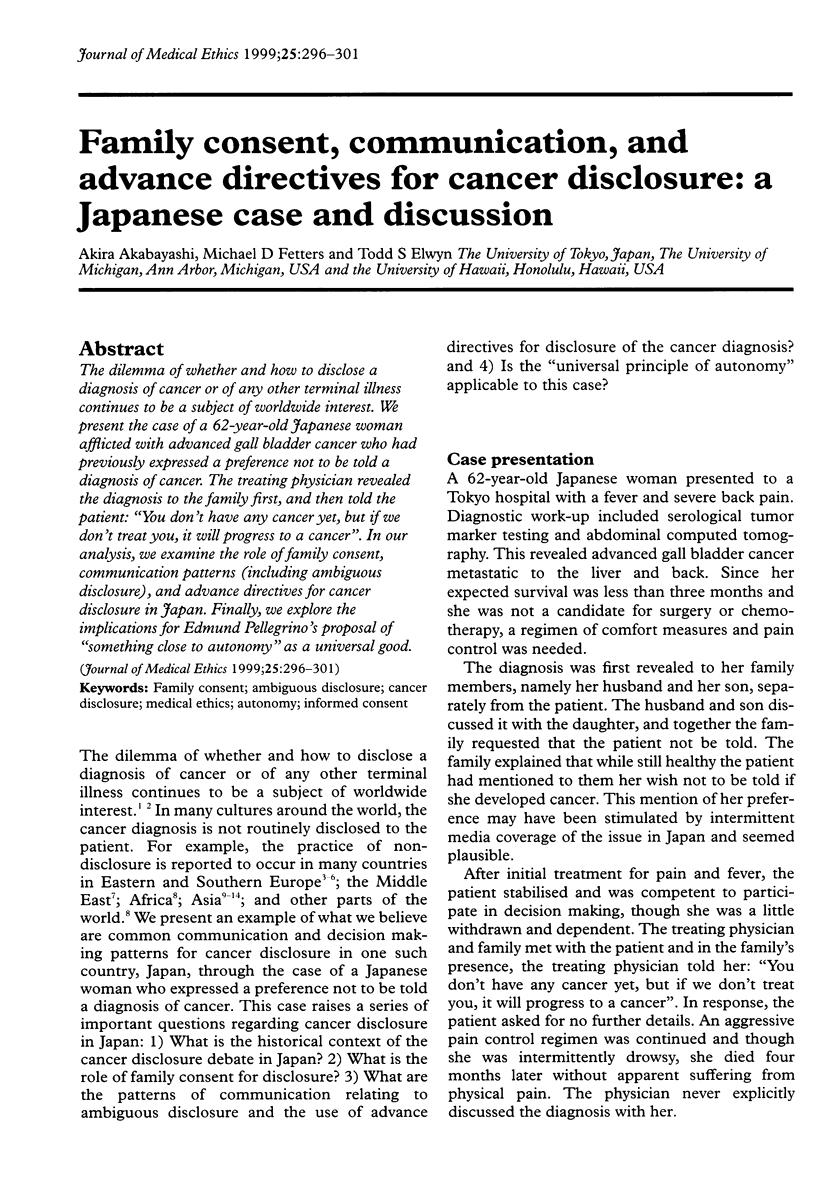
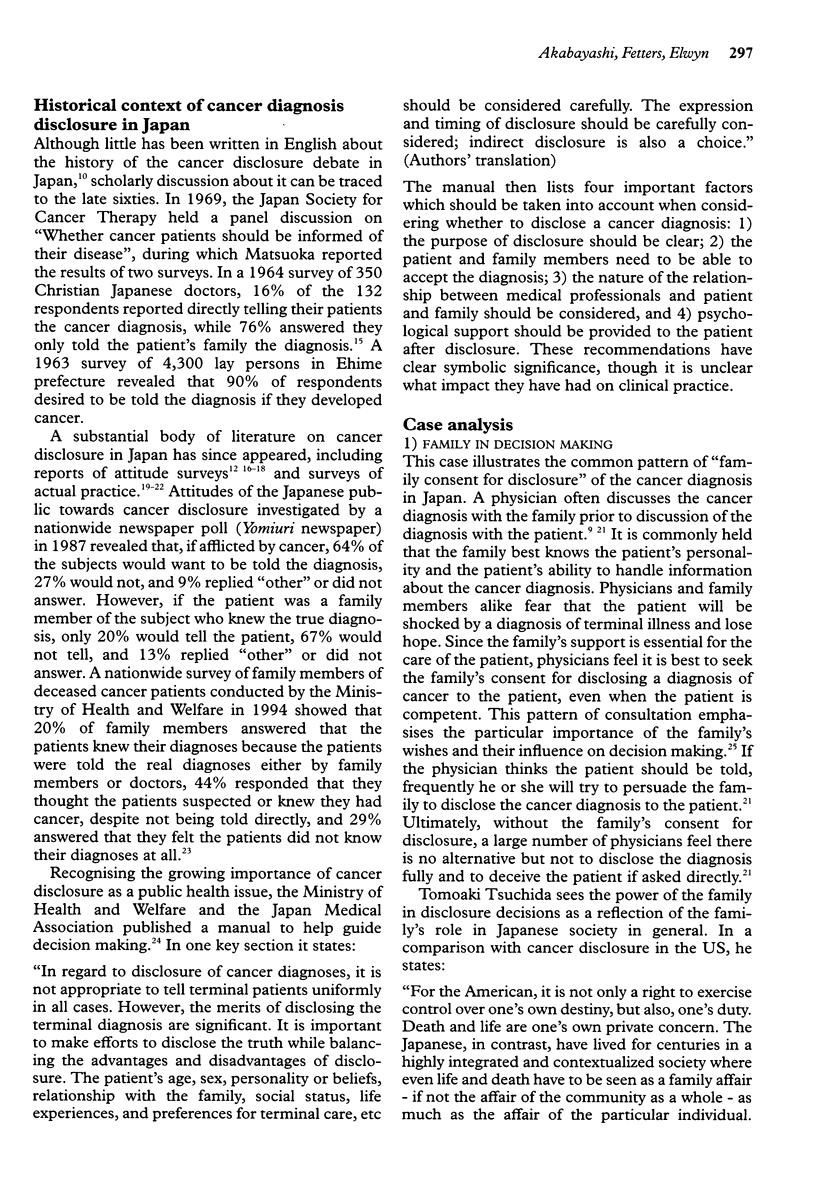
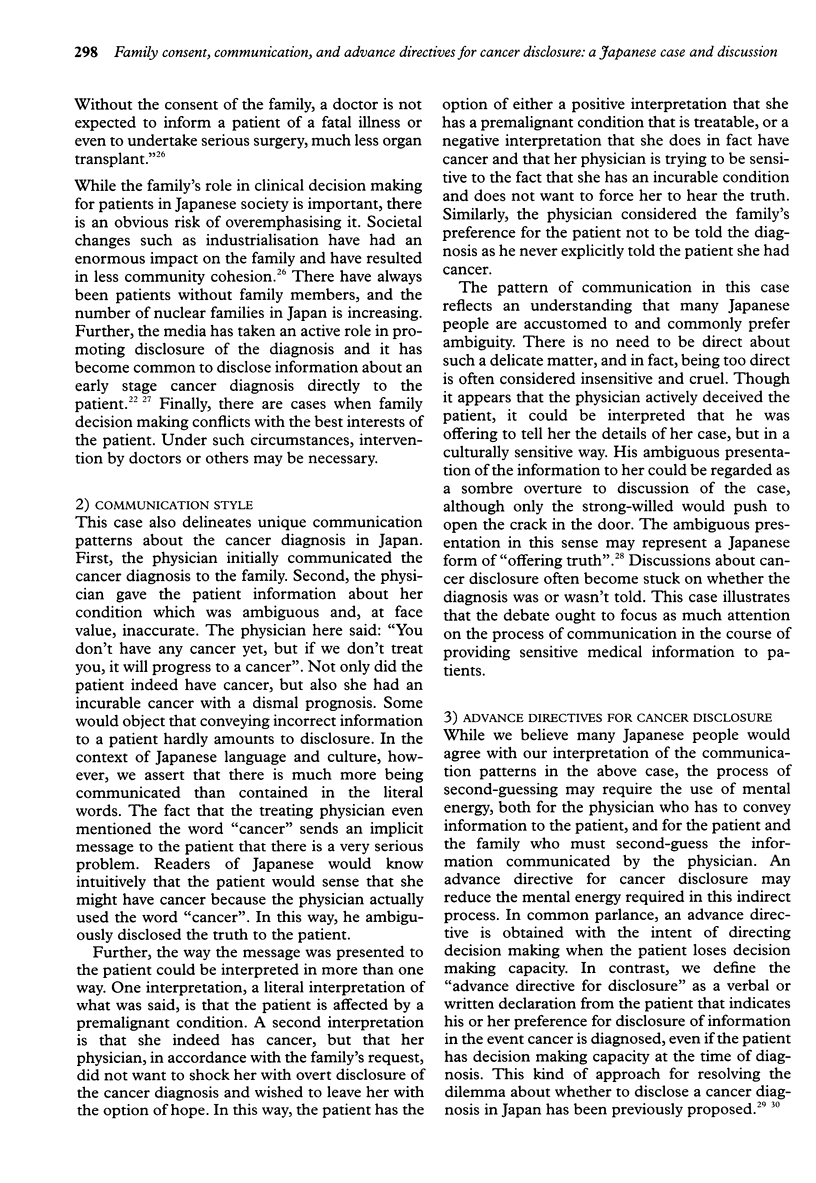
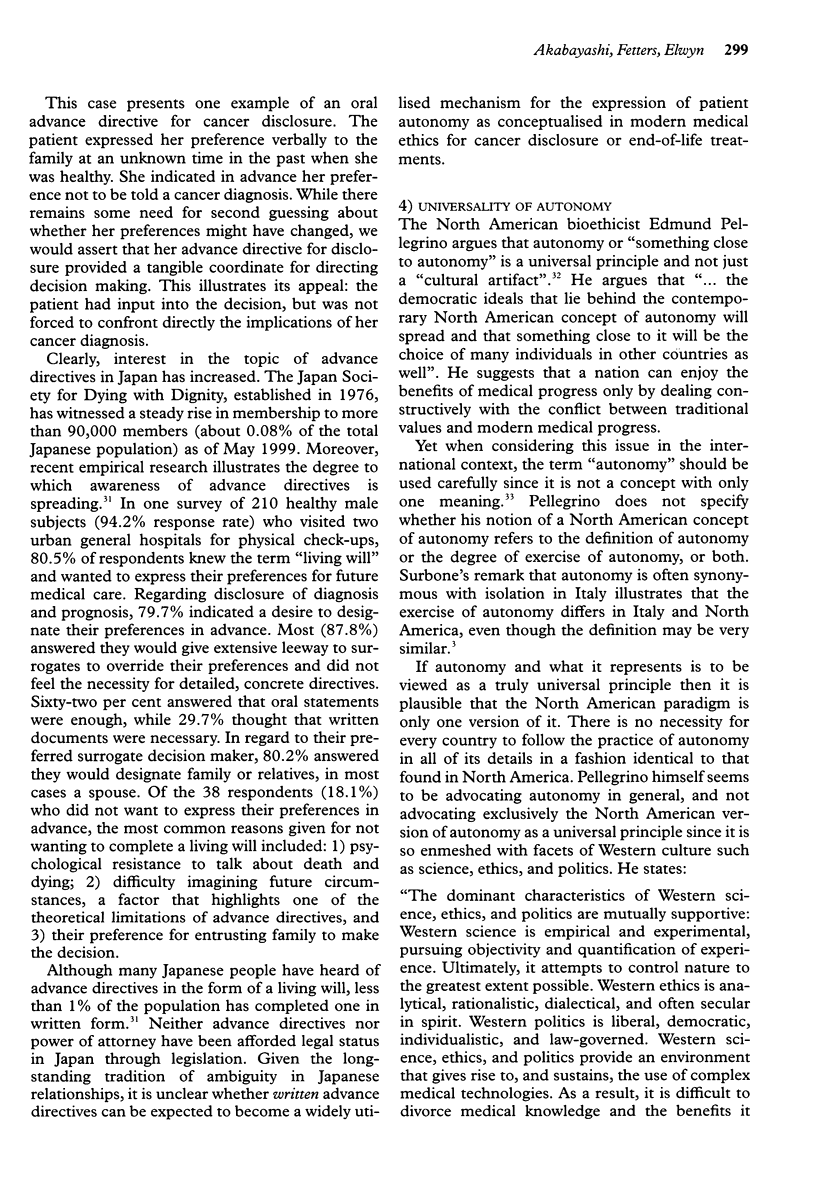
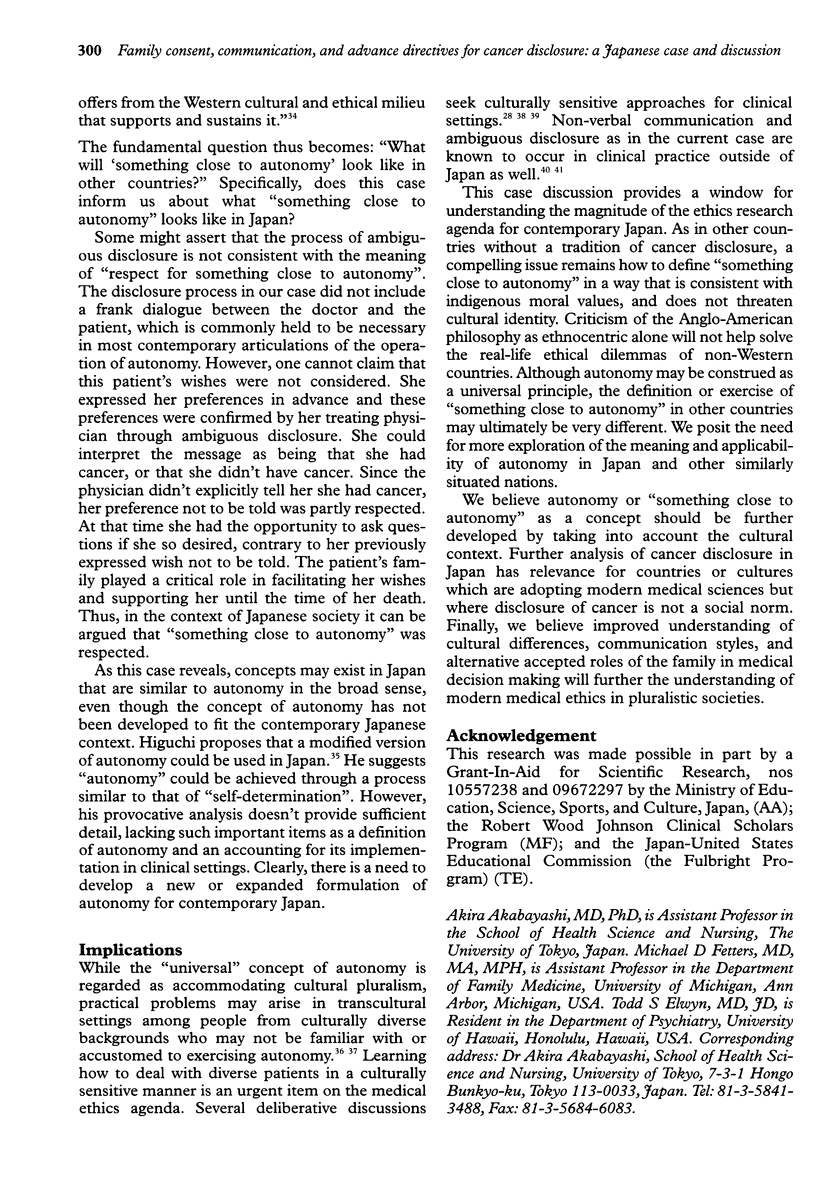
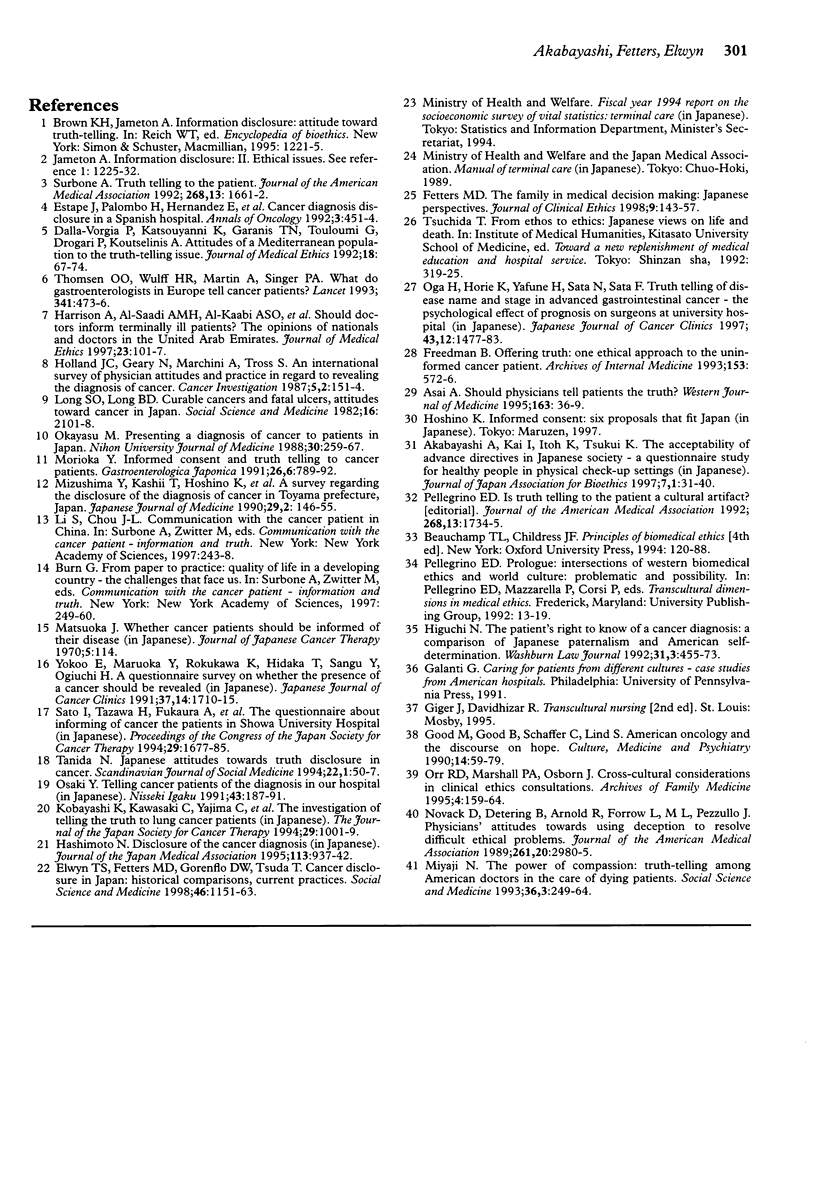
Selected References
These references are in PubMed. This may not be the complete list of references from this article.
- Asai A. Should physicians tell patients the truth? West J Med. 1995 Jul;163(1):36–39. [PMC free article] [PubMed] [Google Scholar]
- Dalla-Vorgia P., Katsouyanni K., Garanis T. N., Touloumi G., Drogari P., Koutselinis A. Attitudes of a Mediterranean population to the truth-telling issue. J Med Ethics. 1992 Jun;18(2):67–74. doi: 10.1136/jme.18.2.67. [DOI] [PMC free article] [PubMed] [Google Scholar]
- Delvecchio Good M. J., Good B. J., Schaffer C., Lind S. E. American oncology and the discourse on hope. Cult Med Psychiatry. 1990 Mar;14(1):59–79. doi: 10.1007/BF00046704. [DOI] [PubMed] [Google Scholar]
- Elwyn T. S., Fetters M. D., Gorenflo W., Tsuda T. Cancer disclosure in Japan: historical comparisons, current practices. Soc Sci Med. 1998 May;46(9):1151–1163. doi: 10.1016/s0277-9536(97)10042-9. [DOI] [PubMed] [Google Scholar]
- Estapé J., Palombo H., Hernández E., Daniels M., Estapé T., Grau J. J., Viñolas N., Mañ J. M. Cancer diagnosis disclosure in a Spanish hospital. Ann Oncol. 1992 Jun;3(6):451–454. doi: 10.1093/oxfordjournals.annonc.a058233. [DOI] [PubMed] [Google Scholar]
- Freedman B. Offering truth. One ethical approach to the uninformed cancer patient. Arch Intern Med. 1993 Mar 8;153(5):572–576. doi: 10.1001/archinte.153.5.572. [DOI] [PubMed] [Google Scholar]
- Harrison A., al-Saadi A. M., al-Kaabi A. S., al-Kaabi M. R., al-Bedwawi S. S., al-Kaabi S. O., al-Neaimi S. B. Should doctors inform terminally ill patients? The opinions of nationals and doctors in the United Arab Emirates. J Med Ethics. 1997 Apr;23(2):101–107. doi: 10.1136/jme.23.2.101. [DOI] [PMC free article] [PubMed] [Google Scholar]
- Higuchi Norio. The patient's right to know of a cancer diagnosis: a comparison of Japanese paternalism and American self-determination. Washburn Law J. 1992 Spring;31(3):455–473. [PubMed] [Google Scholar]
- Holland J. C., Geary N., Marchini A., Tross S. An international survey of physician attitudes and practice in regard to revealing the diagnosis of cancer. Cancer Invest. 1987;5(2):151–154. doi: 10.3109/07357908709018468. [DOI] [PubMed] [Google Scholar]
- Long S. O., Long B. D. Curable cancers and fatal ulcers. Attitudes toward cancer in Japan. Soc Sci Med. 1982;16(24):2101–2108. doi: 10.1016/0277-9536(82)90259-3. [DOI] [PubMed] [Google Scholar]
- Miyaji N. T. The power of compassion: truth-telling among American doctors in the care of dying patients. Soc Sci Med. 1993 Feb;36(3):249–264. doi: 10.1016/0277-9536(93)90008-r. [DOI] [PubMed] [Google Scholar]
- Mizushima Y., Kashii T., Hoshino K., Morikage T., Takashima A., Hirata H., Kawasaki A., Konishi K., Yano S. A survey regarding the disclosure of the diagnosis of cancer in Toyama Prefecture, Japan. Jpn J Med. 1990 Mar-Apr;29(2):146–155. doi: 10.2169/internalmedicine1962.29.146. [DOI] [PubMed] [Google Scholar]
- Morioka Y. Informed consent and truth telling to cancer patients. Gastroenterol Jpn. 1991 Dec;26(6):789–792. doi: 10.1007/BF02782871. [DOI] [PubMed] [Google Scholar]
- Novack D. H., Detering B. J., Arnold R., Forrow L., Ladinsky M., Pezzullo J. C. Physicians' attitudes toward using deception to resolve difficult ethical problems. JAMA. 1989 May 26;261(20):2980–2985. [PubMed] [Google Scholar]
- Orr R. D., Marshall P. A., Osborn J. Cross-cultural considerations in clinical ethics consultations. Arch Fam Med. 1995 Feb;4(2):159–164. doi: 10.1001/archfami.4.2.159. [DOI] [PubMed] [Google Scholar]
- Surbone A. Truth telling to the patient. JAMA. 1992 Oct 7;268(13):1661–1662. [PubMed] [Google Scholar]
- Thomsen O. O., Wulff H. R., Martin A., Singer P. A. What do gastroenterologists in Europe tell cancer patients? Lancet. 1993 Feb 20;341(8843):473–476. doi: 10.1016/0140-6736(93)90218-6. [DOI] [PubMed] [Google Scholar]



